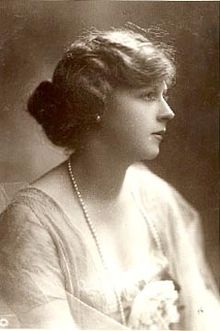Marie Lohr
Marie Lohr | |
|---|---|
 | |
| Born | Marie Kaye Wouldes Lohr 28 July 1890 Sydney, New South Wales, Australia |
| Died | 21 January 1975 (aged 84) |
| Other names | Marie Löhr |
| Occupation | Actress |
| Years active | 1894–1968 |
| Spouse(s) | Anthony Prinsep |
| Parents |
|
Marie Lohr (28 July 1890 – 21 January 1975) was an Australian-born film and stage actress, active on stage and in film in Britain.
Biography[]
Marie Löhr was born in Sydney, New South Wales, to Lewis J. Löhr, treasurer of the Melbourne opera house, and his wife, the English actress Kate Bishop (1848–1923). Her maternal uncle, Alfred Bishop, along with her godparents, William and Madge Kendal, were also actors.[1] She married at St-Martins-in-the-Fields in 1912.[2] She divorced her spouse Mr. Anthony Leyland Prinsep, the theatrical producer, in 1928. They had one child. [3] Her godparents were the actors the Kendals, on the death of Dame Madge Kendal in 1935, Lohr inherited their property at Filey.[4]
Career[]
Her first stage appearance was in Sydney, aged 4, in The World Against Her. Her London debut (after the family's move to Britain), was at age ten, in Shockheaded Peter as well as The Man Who Stole the Castle. (Shockheaded Peter also starred Kate Bishop and George Grossmith Jr., and was produced at the Garrick Theatre in 1900.) [5] The run was curtailed by the death of Queen Victoria, and brought back in 1901, a critic commented "one little actress, 'A Child', represented by Miss Marie Lohr, I think, being particularly good".[6] Her later stage-work included appearances in a 1929 London stage production of Beau Geste alongside Laurence Olivier, and in the original production of the 1930 play The Bread-Winner.
Her first film appearance was in the 1932 film version of Aren't we All?, and — having appeared in several of George Bernard Shaw's works onstage — her subsequent films included two Shaw adaptations. The Noel Coward play Present Laughter was shown as a 'Play of the Week' broadcast by ATV in 1967, Lohr appears alongside Peter O'Toole and Honor Blackman.[7] Later that year she was on tour as 'Lady Hunstanton' with the cast of A Woman Of No Importance a revival of the play by Oscar Wilde, adapted by Paul Dehn.[8] Lohr died at the age of 84, and was buried in the Brompton Cemetery in west London.
Filmography[]

- The Real Thing at Last (1916, Short) – Murdered Woman
- Victory and Peace (1918) – Barbara Rowntree
- Aren't We All? (1932) – Lady Frinton
- Lady in Danger (1934) – Lady Brockley
- Road House (1934) – Lady Hamble
- Mon Coeur t'Appelle (1934, English version: My Heart is Calling You) – Modiste
- My Heart is Calling (1935) – Manageress of Dress Salon
- Oh, Daddy! (1935) – Lady Linda Pye
- Royal Cavalcade (1935) – Mother
- Fighting Stock (1935) – Mrs. Barbara Rivers
- Cock o' the North (1935) – Mary Barton
- Foreign Affaires (1935) – Mrs. Cope
- Whom the Gods Love: The Original Story of Mozart and His Wife (1936) – the Empress
- Dreams Come True (1936) – Helen von Waldenau
- Reasonable Doubt (1936)
- It's You I Want (1936) – Constance Gilbert
- South Riding (1938) – Mrs. Beddows
- Pygmalion (1938) – Mrs. Higgins
- A Gentleman's Gentleman (1939) – Mrs. Handside-Lane
- George and Margaret (1940) – Alice
- Major Barbara (1941) – Lady Britomart
- Went the Day Well? (1942) – Mrs. Fraser
- Kiss the Bride Goodbye (1945) – Emma Blood
- Twilight Hour (1945) – Lady Chetwood
- The Rake's Progress (1945) – Lady Angela Parks
- The Magic Bow (1946) – Countess de Vermond
- The Ghosts of Berkeley Square (1947) – Lottie
- Anna Karenina (1948) – Princess Scherbatsky
- Counterblast (1948) – Mrs. Cole
- The Winslow Boy (1948) – Grace Winslow
- Silent Dust (1949) – Lady Clandon
- Little Big Shot (1952) – Mrs. Maddox
- Always a Bride (1953) – Dowager
- Out of the Clouds (1955) – Rich Woman
- Escapade (1955) – Stella Hampden, Senior
- On Such a Night (1956, Short) – Lady Falconbridge
- A Town Like Alice (1956) – Mrs. Dudley Frost
- Seven Waves Away (1957) – Dorothy Knudson
- Small Hotel (1957) – Mrs. Samson-Fox
- The Last Chronicle of Barset (1959, TV Series) – Lady Lufton
- Carlton-Browne of the F.O. (1959) – Lady Carlton-Browne
- The Plane Makers (1964, TV Series) – Geraldine Pettifur
- Great Catherine (1968) – Dowager Lady Gorse (final film role)
References[]
- ^ Higgins, Sydney. "Marie Löhr (1890–1975)". THE GOLDEN AGE OF BRITISH THEATRE (1880–1920). Archived from the original on 27 March 2016. Retrieved 20 October 2013.
- ^ "Marie Lohr's Wedding". The Stage. 15 August 1912. p. 17.
- ^ "Miss Marie Lohr". Coventry Evening Telegraph. 6 February 1929. p. 3.
- ^ "£60,000 Fortune of the Kendals". Hull Daily Mail. 16 September 1935. p. 7.
- ^ The Times, 27 December 1900, p. 8
- ^ "Amusements". The Sphere. 28 December 1901. p. 28.
- ^ "Play of the Week". The Stage. 2 February 1967. p. 9.
- ^ "Another Wilde Revival". The Stage. 19 October 1967. p. 20.
External links[]
| Wikimedia Commons has media related to Marie Lohr. |
- Marie Lohr at IMDb
- "Lohr, Marie". Oxford Dictionary of National Biography (online ed.). Oxford University Press. doi:10.1093/ref:odnb/40471. (Subscription or UK public library membership required.)
- findagrave.com
- Australian emigrants to England
- Australian film actresses
- Australian silent film actresses
- 20th-century Australian actresses
- Australian stage actresses
- Australian child actresses
- People from Sydney
- 1890 births
- 1975 deaths
- Burials at Brompton Cemetery
- English film actresses
- English stage actresses
- English child actresses
- 20th-century English actresses
- Australian emigrants to the United Kingdom
- 19th-century Australian women